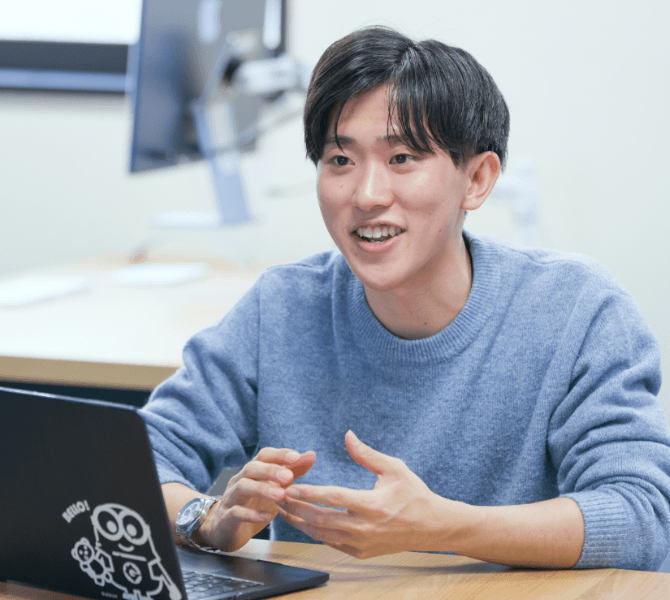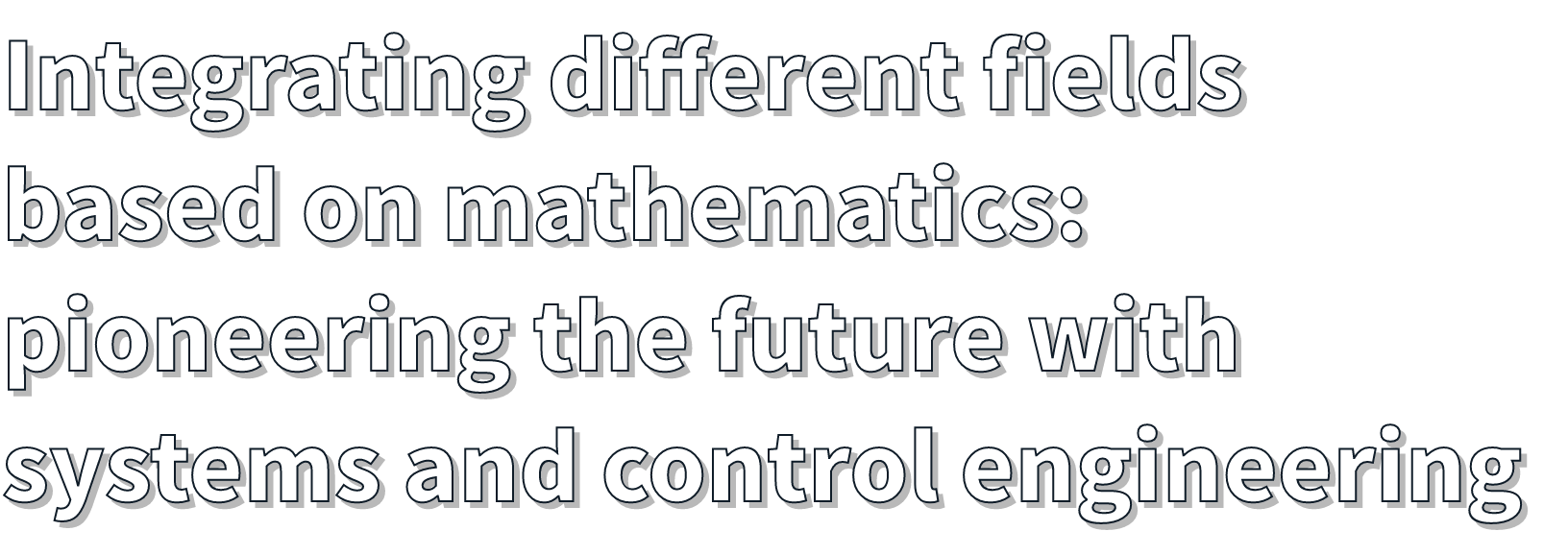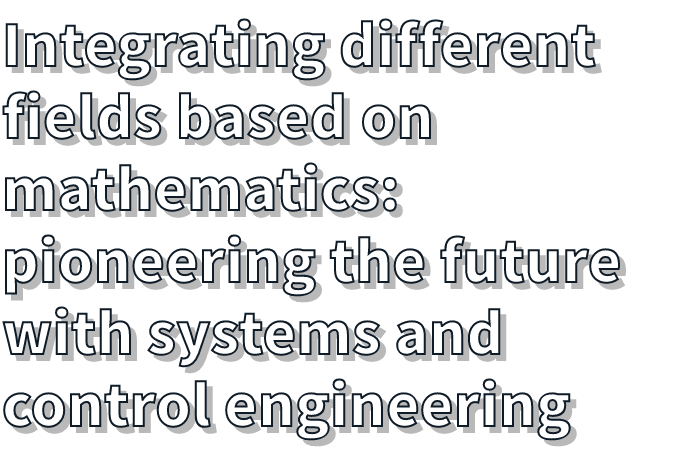

School of Engineering
Department of Systems and Control Engineering
Graduate Major in Systems and Control Engineering
Taku Nishino
From early graduation to doctoral studies:
tackling the issue of power system stabilization through systems and control engineering
I enrolled in the School of Engineering at Institute of Science Tokyo (then Tokyo Institute of Technology) in April 2018. I had been aiming to earn a doctorate since my undergraduate days and wanted to enter the doctoral program as quickly as possible, so I studied hard to earn my bachelor’s degree early. As a result, I was able to meet the requirements for early graduation in September 2021, and advanced to the master’s program.
In September 2023, I completed the master’s program and moved on to the doctoral program. I’m now enrolled in the Department of Systems and Control Engineering in the School of Engineering. Systems and control engineering is a field that studies various real-world systems by expressing them as mathematical models and clarifies their stability and other characteristics mathematically. Its applications are diverse, from robots, drones, and autonomous cars, to systems that govern electric power, transportation, and atomic clock time synchronization.
The electric power industry is currently moving away from thermal power (generated via heat from fuels) to renewable energy sources, such as solar power, to realize a carbon-free society. However, unlike conventional thermal power, there are concerns that renewable energy power sources are subject to large output fluctuations and lack the “inertia” needed to maintain grid stability.
To solve these problems, I am conducting research to analyze grid stability and applying that analysis to develop next-generation inverter controls. In the future, I hope to put grid-forming (GFM) inverters into practical use, develop a mathematical model that quantifies the value of system inertia, and contribute to the creation of new system designs in the electric power market.


Accelerating research and learning
As the name implies, the Academy of Energy and Informatics allows its members to meet and interact with other students and companies involved in the energy sector.
My research topic, power system operation, is closely related to a wide range of energy technologies. Knowledge of fuel cells, wind power, and photovoltaic (solar) power generation is essential for inverter control development, and mathematical modeling of synchronous generators requires an understanding of thermal, hydro, and nuclear power generation. Recent years have seen remarkable technological innovations, such as ammonia co-firing, hydrogen power generation, and new nuclear power controls, as well as advances in energy transportation outside of power transmission, such as electric vehicles and hydrogen delivery. I decided to apply for this program because I believe that studying at the Academy will allow me to keep a close eye on trends in the energy industry as a whole, which will be extremely useful for my future research plans.
My supervisor and senior students in my laboratory strongly recommended that I apply, and I also felt that it would be useful to study topics that will remain essential in the future – information technology, machine learning, and statistics – in addition to studying the energy sector. Another reason to apply was the opportunity to go abroad for the International Forum. I felt that it was meaningful to put myself in an environment where I would be exposed to English, which was not my strong suit.
Entering uncharted territory on a foundation of mathematics:
expanding perspectives at the Academy of Energy and Informatics


The Academy of Energy and Informatics has many students in the fields of chemistry and electrical engineering, allowing students to interact with their peers from a wide variety of specializations. Not only did I gain new perspectives and knowledge in my own field of study, but I was also exposed to research and discussions that involved topics I would not normally have the opportunity to explore, such as fuel cells and power equipment design.
As I mentioned earlier, systems and control engineering is the study of modeling, analysis, and control of all systems based on mathematics. I believe that one of its chief characteristics is that its scope is not black and white. My research focuses on power system operation, but through my studies at the Academy, I hope to create new value by applying systems and control engineering to solutions to problems in the energy sector, such as establishing new energy operation methods. Furthermore, I hope to create synergies by building on the strength of mathematics in this field. To this end, I would like to continue to actively engage with students from different fields.
One of the most impressive multi-scope classes was the class on big data in science. Energy data analysis using the digital twin of Ene-Swallow®, which was constructed on Science Tokyo’s Ookayama Campus, was a valuable opportunity to experience an actual use case of big data. In today’s information-oriented world, the use of data is becoming increasingly important in the electric power sector as well. As a researcher in the energy sector, I was reminded of the importance of obtaining a deeper understanding of the information field.
Challenge without fear of failure:
invaluable experience at the International Forum
During my research and academic activities at the Academy of Energy and Informatics, the area in which I feel I have grown the most is my international perspective. The Academy holds an International Forum once a year to help students acquire an international outlook and intercultural collaboration skills through research exchange activities with overseas partner institutions. This year (2024), I traveled to London – by myself! – with the goal of staying at a university overseas for one week, where I would discuss my own research and research at my host institution to develop a joint research project. It was my first time traveling abroad alone, and I could barely speak English. On the first day of my stay, even shopping was a struggle. However, after staying there for a week, I gradually began to improve my language skills.
When I returned home, I gave a presentation on the results of the trip – in English, naturally. Among the professors who attended my presentation on the results of the trip back at Science Tokyo, there was a foreign professor specializing in chemistry. Due to a combination of differences in fields of study and my lack of English ability, I had a hard time communicating what I wanted to say. However, the professor took their time to carefully ask questions so that I could answer them, and I was able to convey what I wanted to say.
In real-world business situations, your business partners may not always listen to you with as much patience. However, the Academy helps you hone your abilities to explain and communicate in an environment where teachers and other students are willing to make an effort to understand you. I think this is a valuable opportunity to overcome my own challenges before starting my professional career. While enrolled in this Academy, I believe that tackling obstacles of any size, experiencing failure and setbacks, and learning how to succeed will lead to personal growth.
It’s important to note that one of the great features of this Academy is the financial support it provides. I’m extremely thankful that it covered all my travel and accommodation expenses for events like the International Forum.
Academia or the private sector?
Applying problem-solving skills and pursuing possibilities


I’m still hesitating about my future plans. Last year, I had the opportunity to meet a corporate mentor through an Academy program and got to intern at research laboratory and a company last fall and winter. During my corporate internship, I was involved in the development of analysis software used in power supply stations, which are central facilities for generating electricity. I felt that if I worked for a similar research institution, I would be able to more directly feel that what I developed was benefitting society.
On the other hand, if I choose the path of academia, I believe that I will not only be able to immerse myself in simulations and theoretical research based on mathematics, but also explore a variety of other fields related to my interests. For example, knowledge gained from research into power systems can be applied to transportation systems and network analysis in other areas. I believe that the opportunity to obtain research funding and conduct research freely is something only academia can offer.
At this point, I feel that a research career suits me better, but I would like to choose my career direction as quickly as possible and become a researcher who can apply the problem-solving skills I have developed here to a wide range of fields.
Why your research matters to society:
Honing practical skills at the Academy of Energy and Informatics
I think there are great advantages for doctoral students to enroll at the Academy of Energy and Informatics. In addition to receiving financial support, students can hone the perspectives and skills researchers need by engaging with students from different fields, companies, and overseas universities. Students can also gain experience through corporate internships and other opportunities to learn about the challenges and needs of the real industrial world. Remaining aware of connections to society outside the laboratory enables us to conduct more practical research.
Furthermore, doctoral students must be able to communicate the significance of their research to society when writing research applications and obtaining research funding. When participating in a corporate internship, a department head once told me, “While you are a doctoral student, it’s important to stay aware of the current challenges in the industry, how what you developed is different from existing technologies, who will benefit from it, and what kind of business will it lead to?” Broadening your horizons, by studying outside your own field at this Academy, and by practicing communicating the value of your research to people in different fields, will be a great advantage in your future career.
The Academy of Energy and Informatics is a place where researchers can not only improve their skills, but also receive support for research, and cultivate an awareness of how those activities relate to society. I would encourage anyone who wants to use their research to benefit society to take advantage of this opportunity.
School of Engineering
Department of Systems and Control Engineering
Graduate Major in Systems and Control Engineering
Taku Nishino

School of Engineering
Department of Systems and Control Engineering
Graduate Major in Systems and Control Engineering
Taku Nishino
- April 2018
- Enrolled in the School of Engineering at Institute of Science Tokyo
- April 2019
- Enrolled in the Department of Systems and Control Engineering in the School of Engineering
- April 2019
- Enrolled in the Graduate Major in Systems and Control Engineering
- April 2023
- Registered for the Academy of Energy and Informatics
(As of February 2025)




